Advertisements
Chapters
2: A Snake Charmer’s Story
3: From Tasting to Digesting
4: Mangoes Round the Year
5: Seeds and Seeds
6: Every Drop Counts
7: Experiments with Water
8: A Treat for Mosquitoes
9: Up You Go!
10: Walls Tell Stories
11: Sunita in Space
▶ 12: What if it Finishes ...?
13: A Shelter so High!
14: When the Earth Shook!
15: Blow Hot, Blow Cold
16: Who will do this Work?
17: Across the Wall
18: No Place for Us?
19: A Seed tells a Farmer’s Story
20: Whose Forests?
21: Like Father, Like Daughter
22: On the Move Again
![NCERT solutions for Environmental Studies - Looking Around [English] Class 5 chapter 12 - What if it Finishes ...? NCERT solutions for Environmental Studies - Looking Around [English] Class 5 chapter 12 - What if it Finishes ...? - Shaalaa.com](/images/environmental-studies-looking-around-english-class-5_6:71bdf81a5f57474cb6fe25f9506ae503.jpg)
Advertisements
Solutions for Chapter 12: What if it Finishes ...?
Below listed, you can find solutions for Chapter 12 of CBSE NCERT for Environmental Studies - Looking Around [English] Class 5.
NCERT solutions for Environmental Studies - Looking Around [English] Class 5 12 What if it Finishes ...? What if it Finishes ...? [Pages 111 - 119]
Look at the picture on page 110 and write
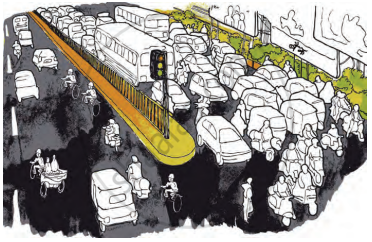
- What are the different kinds of vehicles that you can see?
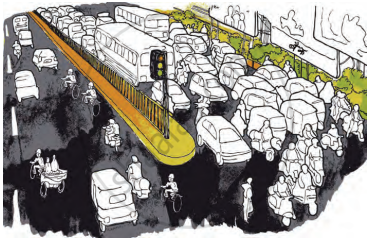
- What do you think they need petrol and diesel as fuel?

- Which of the vehicles do you think to give off smoke? Put a red mark on those.
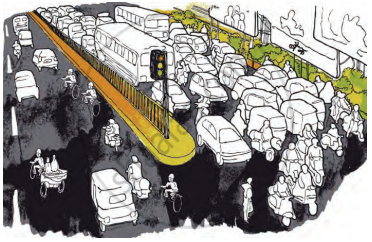
- Which are the vehicles run without petrol and diesel?
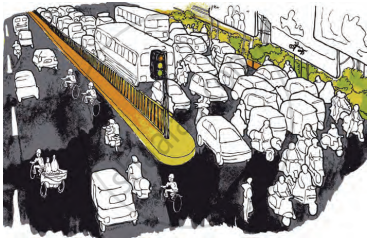
- What problems do we face from speeding vehicles?
Tell
Do you ride a bicycle? If yes, where all do you go on it?
How do you come to school?
How do your family members go to work from home?
What problems can we have from smoke coming out of vehicles?
What kind of problems can we face from noise of vehicles (honking)?
Find out and discuss
Which states of India have oil fields?
Besides oil, what else is found deep inside the earth?
Find out the traffic rules and discuss them in the class.
We should use petrol and diesel judiciously. Think why?
Write
What all can vehicles run on?
What kinds of problems will we face, if the number of vehicles keeps on increasing? For example, more traffic on the road. Talk to your elders and write about it.
Manju said, “Why doesn't everyone use a bus?” What do you think, why don’t people travel by bus?
Suggest some ways to deal with the problems arising out of the growing number of vehicles.
What are the benefits, if we switch off the engine of the vehicles at the red light on the road?
Find out and write
| How much oil? | Scooter | Car | Tractor |
| How much petrol/diesel can be filled at a time? | |||
| How far can it go on one litre of petrol/diesel? |
The rates of petrol are different in each city. The rates of petrol and diesel in Delhi are given here. Look at the table and answer the questions.
| Oil | Rate of one litre in 2002 (Oct) | Rate of one litre in 2007 (Oct) | Rate of one litre in 2014 (Oct) |
| Petrol | Rs 29.91 | Rs 43.52 | Rs 67.86 |
| Diesel | Rs 18.91 | Rs 30.48 | Rs 58.97 |
- In 2014, as compared to 2007 the rate of petrol went up by ______ rupees. The rate of diesel increased by ______ rupees.
The rates of petrol are different in each city. The rates of petrol and diesel in Delhi are given here. Look at the table and answer the questions.
| Oil | Rate of one litre in 2002 (Oct) | Rate of one litre in 2007 (Oct) | Rate of one litre in 2014 (Oct) |
| Petrol | Rs 29.91 | Rs 43.52 | Rs 67.86 |
| Diesel | Rs 18.91 | Rs 30.48 | Rs 58.97 |
- What was the difference in the rates of petrol and diesel from 2002 to 2007 and 2007 to 2014?
Find out
What is the price of petrol and diesel in your area?
Why are the prices of petrol and diesel going up?
In one month how much petrol and diesel is used in your home? What is it used for?
See the poster and write

- Where all is an oil used?
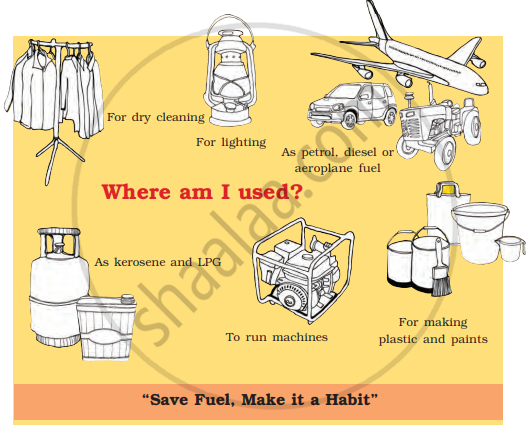
- Where is diesel used? Find out.
Think and discuss
What would happen if you don’t get petrol or diesel for a week in your village or town?
Suggest some ways to save oil.
Discuss
Have you ever collected dry wood or made cow dung cakes? How are they made?
Do you know anyone who collects dry wood or leaves to be used for lighting a chulha?
Who cooks food in your family? What about other families in your area?
If they cook food using wood or upla (cow dung cakes), what difficulties do they face due to smoke?
Can Durga use anything else instead of wood? Why not?
Change in fuel use over twenty years
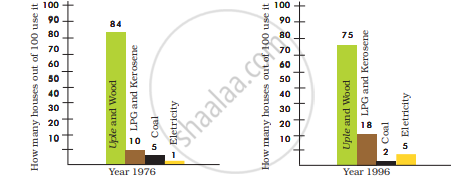
1. In the year 1976, out of 100 how many houses used uple and wood?
2. Which was the fuel used the least in 1976?
3. In 1976, LPG and kerosene were used in ______ houses, and in 1996 this increased to ______. This means that in twenty years their use increased by________%.
4. Out of 100, how many houses were using electricity in 1996?
5. Which fuel was used the least in 1996? What percentage of houses used it in the year 1976?
Find out from your elders
When they were young what was then used to cook food at home?
In the past 10 years use of which cooking fuel has increased in your area? Use of which fuel has decreased?
Find out from your elders
Guess the use of which fuel would increase and which would decrease in the next 10 years.
What we have learnt
Imagine that a company has given you a chance to design a new vehicle like a minibus. What kind of vehicle would you design? Write about it. Draw a picture and colour it.
While making the design, who did you plan to take care of:
| old people | ____________ |
| children | ____________ |
| those who cannot see? | ____________ |
Look out for news reports on oil. Cut these and make a collage. Put up a chart in your classroom. Also, write your own views on these news reports.
Make a poster with a message on saving fuel. Write a slogan too. Where would you like to put up this poster?
Solutions for 12: What if it Finishes ...?
![NCERT solutions for Environmental Studies - Looking Around [English] Class 5 chapter 12 - What if it Finishes ...? NCERT solutions for Environmental Studies - Looking Around [English] Class 5 chapter 12 - What if it Finishes ...? - Shaalaa.com](/images/environmental-studies-looking-around-english-class-5_6:71bdf81a5f57474cb6fe25f9506ae503.jpg)
NCERT solutions for Environmental Studies - Looking Around [English] Class 5 chapter 12 - What if it Finishes ...?
Shaalaa.com has the CBSE Mathematics Environmental Studies - Looking Around [English] Class 5 CBSE solutions in a manner that help students grasp basic concepts better and faster. The detailed, step-by-step solutions will help you understand the concepts better and clarify any confusion. NCERT solutions for Mathematics Environmental Studies - Looking Around [English] Class 5 CBSE 12 (What if it Finishes ...?) include all questions with answers and detailed explanations. This will clear students' doubts about questions and improve their application skills while preparing for board exams.
Further, we at Shaalaa.com provide such solutions so students can prepare for written exams. NCERT textbook solutions can be a core help for self-study and provide excellent self-help guidance for students.
Concepts covered in Environmental Studies - Looking Around [English] Class 5 chapter 12 What if it Finishes ...? are What If It Finishes ...?.
Using NCERT Environmental Studies - Looking Around [English] Class 5 solutions What if it Finishes ...? exercise by students is an easy way to prepare for the exams, as they involve solutions arranged chapter-wise and also page-wise. The questions involved in NCERT Solutions are essential questions that can be asked in the final exam. Maximum CBSE Environmental Studies - Looking Around [English] Class 5 students prefer NCERT Textbook Solutions to score more in exams.
Get the free view of Chapter 12, What if it Finishes ...? Environmental Studies - Looking Around [English] Class 5 additional questions for Mathematics Environmental Studies - Looking Around [English] Class 5 CBSE, and you can use Shaalaa.com to keep it handy for your exam preparation.
